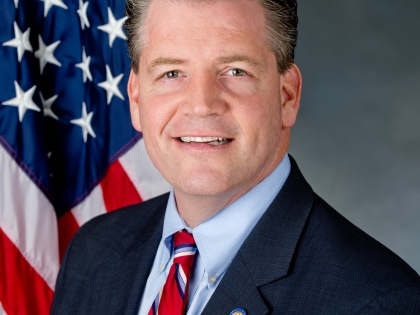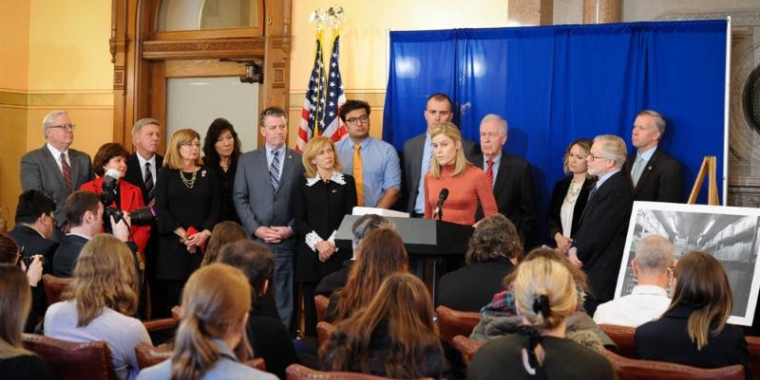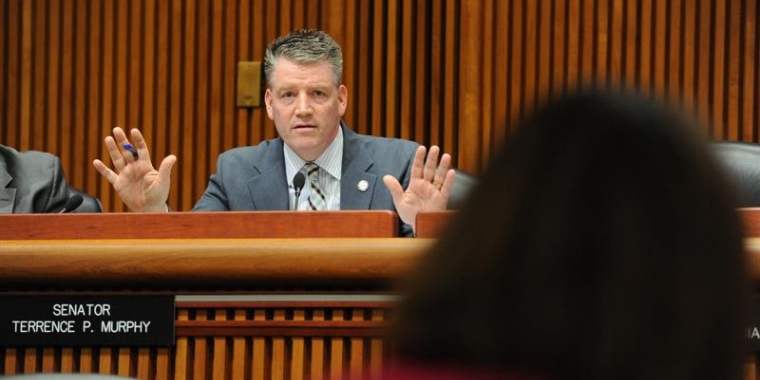
Murphy votes for Senate budget: tax relief, record school funding, fiscal discipline
March 15, 2016

ALBANY, NY - Senator Terrence Murphy, an advocate for small government and fiscal responsibility, has voiced his full support for the Senate's 2016-17 budget. The Senate proposal restrains state spending, provides significant new tax savings for hardworking middle-class taxpayers, and invests in the shared priorities of New Yorkers and their families.
"This budget proposal is a blueprint for a responsible and on-time spending plan that will help make the Hudson Valley a more affordable place to live, work and raise our children," Senator Murphy said. "I strongly believe this proposal will provide significant tax relief, address New York's needs to win the war on heroin and opioid addiction, ensure parity in infrastructure funding and deliver critical dollars to our local classrooms which in turn will give every child the opportunity to succeed."
Senate Majority Leader John J. Flanagan added, "The Senate has once again listened to the concerns of New Yorkers who are looking to create a brighter future for their children and families. This comprehensive budget proposal includes real tax relief for millions of middle-class families, increases support for our schools to a record level, spurs the growth of our economy to create more jobs, and continues a fiscally responsible approach to strengthen New York's finances for the long-term."
The Senate budget proposal stays within the self-imposed two-percent spending cap, and advances a proposal to pass a Constitutional amendment to permanently require this budgeting restraint moving forward; a measure sponsored by Senator Murphy.
A highlight of the Senate Republicans' budget is the new Middle Class Income Tax Relief Program that establishes the lowest middle class tax rate in more than 70 years. Starting in 2018, a total of 5 million eligible taxpayers - including more than 770,000 small businesses who file under the Personal Income Tax (PIT) - would begin to see savings. When fully implemented in 2025, middle class New Yorkers will pay a 25 percent lower tax rate and save $3.5 billion in taxes each year.
The budget plan calls for fully eliminating the 18-a utility tax surcharge by the end of 2016 that would save taxpayers $125 million. In 2009, this utility tax surcharge cost ratepayers nearly $600 million annually until action was taken four years later. In 2014, the Enacted Budget contained an additional $600 million in savings over the remaining phase-out, which is scheduled to be completed by the end of 2017.
The School Tax Relief (STAR) program is a long-standing Senate priority that provides significant savings for taxpayers each year. The Senate rejected the Executive Budget proposal to cap STAR at 2015-16 levels and seeks to provide $56 million in additional STAR benefits to fully fund the school property tax exemptions this fall. The Senate proposal also makes the STAR rebate checks permanent.
Since it was first approved, Senate Republicans have been leading the charge to abolish the Gap Elimination Adjustment (GEA) and deliver major funding increases to help mitigate its impact on education. The Senate budget restores the remaining $434 million in GEA cuts for schools in 2016-17 and permanently eliminates these harmful education budget reductions.
In the past five years, the GEA cuts have been reduced by approximately 85 percent to $434 million in the 2015-16 budget. Last year alone, Senator Murphy approved sending an additional $603 million to help schools overcome the GEA challenge created by the mismanagement of the state's budget and helped restore millions of dollars in state aid to schools.
The Senate budget proposal includes a year-to-year 7.15 percent school aid increase of $1.655 billion. The $24.8 billion education proposal would provide a record amount of education funding, with highlights including:
- An $880 million increase in Foundation Aid over 2015-16;
- Full funding of $341.9 million in Expense Base Aids;
- A $1.3 billion - 8.3 percent - increase in total operating support;
- An additional $27.4 million for grants in aid to Charter schools;
- An additional $10 million for the Library Construction Fund;
- An increase of $5 million in Library aid;
- Provides $4.6 million in new nonpublic school aid, in addition to $2.6 million included inthe Executive Budget; and
- An additional $4.1 million for 4201 schools for the blind and the deaf.
To help address the growth in heroin and opioid abuse in communities throughout the state, the Senate budget includes a total of $167 million to strengthen prevention, treatment, recovery, and education services. This includes an increase of more than 18 percent above the Executive Budget proposal, with the additional $26 million going to support:
- $10 million for transitional housing for individuals in recovery, with 25 percent of these funds to be used for individuals ages 15-24;
- $6.5 million for additional recovery services;
- $3.85 million for 11 additional Recovery Community Centers. The Executive Budget proposed to expand the number of Recovery Community Centers in the state by six, from the current number of three to a total of nine. The Senate proposal would bring the total to 20, and would require that all centers be distributed on a geographically even basis;
- $2 million for school prevention efforts;
- $2 million for Recovery Coaches;
- $1 million for an additional 10 Family Support Navigators, who will assist New Yorkers and their families with navigating insurance and treatment systems. The Executive Budget proposes 10 Navigators to be regionally distributed statewide and the Senate proposal doubles that commitment to 20, helping to ensure their services would be distributed on a geographically even basis;
- $450,000 for opioid drug addiction, prevention and treatment programs; and
- $200,000 for Family Support Navigator training.
The Senate is also proposing the inclusion of S6962, a bill sponsored by Senator Murphy, to prevent the abuse of opioid prescriptions through the use of FDA-approved abuse-deterrent drugs.
In a major victory for fairness and for job creation, the Senate proposal reestablishes parity in infrastructure funding for highways, roads, and bridges between upstate and downstate. The Senate adds an additional $6.5 million for a total of more than $200 million in Upstate transit operating aid. This provides the same 6.1 percent increase in operating assistance the non-MTA Downstate transit systems received in the Executive Budget.
The Senate budget invests in critical health care programs for New Yorkers and their families, including approval of the proposed breast cancer screening initiative. It also restores $1.37 million for essential women's health initiatives, $1 million for recommendations of the Senate's Lyme and Tick-Borne Disease Task Force, and $1 million to support organ donation efforts across the state, among other health program funding.
The Senate budget establishes a domestic violence offender registry to help combat and root out the scourge of domestic violence across the state - - preventing abusers from doing more harm and protecting innocent women.
The Senate Majority's budget proposal includes new income tax relief to help more seniors save money and choose to stay in New York during retirement. The tax cut would provide the first increase to the exempt amount of private pensions and retirement income since 1981, saving approximately $275 million annually when fully phased in. This would provide tax relief to more than 377,000 seniors and, in the first year alone, would save each an average of $361.
Building upon its longstanding commitment to protect vulnerable senior citizens, the Senate proposal provides $1.5 million to support elder abuse awareness, screening, and reporting initiatives.
The Senate and Assembly have repeatedly passed legislation (S5937) supported by Senator Murphy that would allow veterans to obtain up to three years of additional credit toward their state retirement benefits for peacetime military service. The Senate advances this legislation as part of the budget proposal to ensure funding is allocated to allow this important veterans initiative becomes law.
Looking toward protecting the environment, the Senate budget includes a record funding of $300 million for the Environmental Protection Fund (EPF) to protect natural resources and ensure clean water and clean air.
Last year, the Senate approved a Constitutional amendment to strip the pensions from corrupt public officials convicted of a felony related to his or her position. The Assembly has not yet acted on this legislation, and the Senate budget proposal again includes pension forfeiture in order to hold elected officials accountable.
The Senate budget advances a proposal approved this year by the Senate (S2722B), sponsored by Senator Murphy, that would set into law eight-year term limits for leadership positions in the Senate and Assembly. This bill is consistent with what is already in place in Senate rules and also limits the number of years a legislator can serve as a committee chair or party leader.



